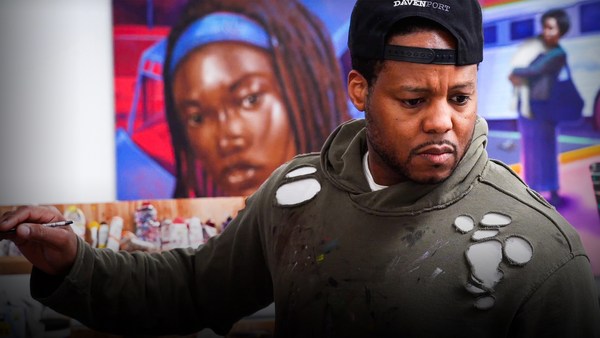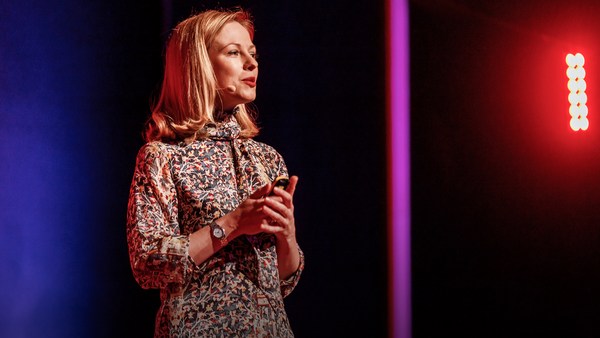Woman: Doc? We're ready for you. Mehret Mandefro: OK.
Man 1: Here we go. Places, please. Last looks.
Man 2: We're at roll time.
Man 3: Rolling! Man 2: Roll cameras.
Man 3: A speed, B speed, C speed.
Man 1: Marker. And ... action.
MM: I started making movies 15 years ago, during my internal medicine residency, as one does. I was doing HIV disparities research amongst Black women, and that work turned into a documentary, and I've been making movies ever since. I like to think of the movies and shows I create as a kind of visual medicine. By that I mean I try to put stories on the screen that address large social barriers, like racism in America, gender inequities in Ethiopia and global health disparities. And it's always my hope that audiences leave inspired to take actions that will help people hurdle those barriers. Visual medicine.
Most of the time, I live and work in Ethiopia, the country I was born in, and currently, I sit on the advisory council of the Ethiopian Government's Jobs Creation Commission. Now, I'm sure you're wondering what a doctor-turned-filmmaker, not economist, is doing working with the Jobs Creation Commission. Well, I believe the creative industries, like film and theater, design and even fashion, can promote economic growth and democratic ideals in any country. I've seen it happen, I've helped it happen, and I'm here to tell you a little bit more.
But first, some context. Over the past 15 years, Ethiopia has had amongst the fastest-growing economies in the world. This growth has led to a reduction in poverty. But according to 2018 numbers, unemployment rates in urban areas is around 19 percent, with higher unemployment rates amongst youth ages 15 to 29. No surprise, those numbers are even higher among young women. Like the rest of Africa, Ethiopia's population is young, which means as the urban labor market continues to grow, people are aging into the workforce, and there aren't enough jobs to go around.
So put yourselves in the shoes of any government struggling to create enough good-paying jobs for a growing population. What do you do? I'm guessing your first thought isn't, "Hey, let's expand the creative sector." We've been conditioned to think of the arts as a nice thing to have, but not really as having a place at the economic growth and security table. I disagree.
When I moved to Ethiopia four years ago, I wasn't thinking about these unemployment issues. I was actually thinking about how to expand operations of a media company I had cofounded, Truth Aid, in the US. Ethiopia seemed like an exciting new market for our business. By the end of my first year there, I joined a fledgling TV station that exploded onto the media scene, Kana TV, as its first executive producer and director of social impact. My job was to figure out how to produce premium original content in Amharic, the official language, in a labor market where the skills and education for film and TV was limited. There was really only one way we could do it. We would have to invest heavily in training.
I was charged with training the scripted drama team, and there was really only one way we could do that: on the job, paying my employees to make TV while they learned how to make TV. Their average age was 24, it was their first job out of university, and they were eager to learn. We built a world-class studio and began.
The first show we created as a product of our training was a scripted series with a powerful family at the center called "Inheritance." The second show was Ethiopia's first teen drama, called "Yegna," and was made in partnership with the nonprofit Girl Effect. These shows turned the cast into overnight stars and won audiences over, and the best part of my job quickly became running what was essentially a content production talent training factory. Kana would go on to make several original content shows, including a health talk show I created called "Hiyiweti," which translates into "my life."
Now, this is obviously great for Kana, but we were doing something bigger. We were creating a model for how training becomes employment in a market where creating new jobs, especially as it relates to young people, is among the largest of demographic challenges.
Now, you can't say you took a bite out of a large social problem like unemployment if the jobs you create only serve the interests of a single private sector company, which is why I didn't stop at TV. I wanted the crews I had trained to have exposure to international standard production and was so thrilled when a Canadian-Irish coproduction that I was executive producing came to Ethiopia to shoot the feature film "Sweetness in the Belly." I contacted the CEO of the state-owned tours in Ethiopia to see if we could use this film as a learning case study for how government can support filmmaking and filmmakers. The argument was, films can promote economic growth and attract tourism dollars in two key ways: by bringing production work to Ethiopia and, more importantly, by promoting Ethiopia and its unique cultural assets to the world. The latter taps into a nation's expressive power.
The government was incredibly receptive and supportive and ended up providing logistical and security support above and beyond what a lone producer could provide on her own, especially to such a large film crew. With their help, we were able to complete shooting the feature film under very challenging conditions, and I was able to hire my TV crews so they could deepen their experiences and work alongside a world-class film crew. This meant our employees could mature and grow and move up their own respective career ladders, not just in our company but in the market at large. Members of our crew have gone on to start their own production companies, joined ad agencies, communication firms, even other TV stations. To me, this multiplier effect is what it's all about.
But the story gets better. This was right around the time the Jobs Creation Commission hired me to conduct a diagnostic study to assess the unmet needs of subsectors like film, visual arts and design and see what government could do to respond to those needs. After we completed the study, we made policy recommendations to incorporate the creative economy in the National Jobs Action Plan as a high-potential services industry. This led to a larger effort called Ethiopia Creates, which is just beginning to organize the creative industry entrepreneurs in the sector so the sector can thrive. Ethiopia Creates recently organized a film export mission to the European film market, where a team of Ethiopian filmmakers were able to pitch their projects for potential financing opportunities.
Now, putting culture on the economic agenda is an incredibly important milestone. But the truth of the matter is, there's far more at stake than just jobs. Ethiopia is at a critical juncture, not just economically but democratically. It seems like the rest of the world is at a similar make-or-break moment. From my perspective on the ground in Ethiopia, the country can go one of two ways: either down a path of inclusive, democratic participation, or down a more divisive path of ethnic divisions. If we all agree that the good way to go is down the inclusive path, the question becomes: How do we get there?
I would argue one of the best ways to safeguard democracy is to expose everyone to each other's stories, music, cultures and histories, and of course, it's the creative economy that does that best. It's the sector that helps teach civil society how to access new ideas that are free of bias. Artists have long found ways to inspire inclusion, tell stories and make music for lasting political impact. The late, great American hero, Congressman John Lewis, understood this when he said, "Without dance, without drama, without photography, the civil rights movement would have been like a bird without wings."
(Bell rings)
Man 1: OK, we're back.
MM: Now imagine how much more effective music, films and arts would be if artists had good-paying jobs and the government supported them. In this case, economic growth and democratic growth go hand in hand. I think any government that views arts as a nice thing to have as opposed to a must-have is kidding itself. Arts and culture in all of their forms are indispensable for a country's economic and democratic growth. It's precisely countries like Ethiopia that can't afford to ignore the very sector that has the potential to make the greatest civic impact. So just as John Lewis understood that the civil rights movement could not take flight without the arts, without a thriving creative sector that is organized like an industry, Ethiopia's future, or any other country at its moment of reckoning, cannot take flight. The economic and democratic gains these industries afford make the creative economy essential to development and progress.
Thank you.
Man 1: And ... cut!
(Applause and cheers)





